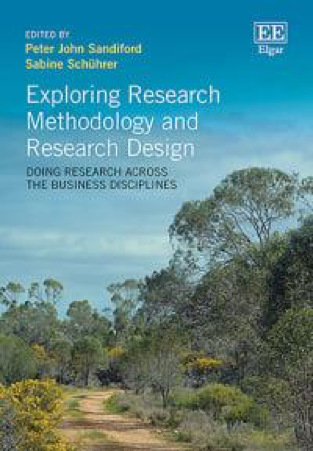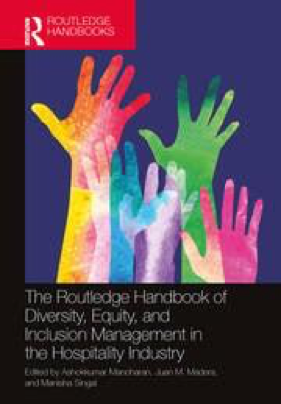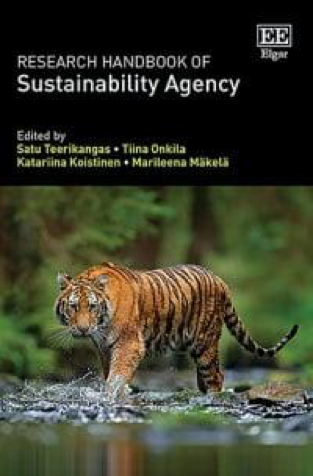
Selected Book Chapters
Exploring Research Methodology and Research Design: Doing Research Across the Business Disciplines

Chapter Abstract:
The chapter explores the methodological opportunities, challenges and implications of using a qualitative, retrospective longitudinal research approach. The chapter is of particular relevance to readers who conduct life-course research and who are interested in better understanding in depth the changes and developments amongst individuals and their mind-sets and motivations, and human behavioral dynamics from the point of view of those being studied. We use a case study as their research vehicle based on which they discuss longitudinal research for qualitative scholarly works exploring changing behaviors and patterns of individuals over time. We outline the richness of data that qualitative longitudinal studies can provide due to their explorative nature and show their importance for projects that explore causal processes and relationships. We also discuss the use of audiovisual material in the empirical data collection process drawing from my experience using YouTube videos in this chapter’s case study.
Authors: Stefan Gröschl and Guillermo Wilches
Year of Publication: 2025
Chapter Title: Doing qualitative retrospective longitudinal research
Editors: P. Sandiford and S. Schuhrer
Publisher: Edward Elgar
Navigating the Ecological Transition

Chapter Abstract:
This chapter explores the concepts of responsible leadership and sustainable business practices, highlighting the importance of distinguishing between companies’ motives and the role of cognitive complexity in driving proactively sustainability. This chapter also examines the role of business schools in preparing students for addressing global socio-economic and environmental challenges in a sustainable and responsible way.
Authors: Stefan Gröschl
Year of Publication: 2024
Chapter Title: Responsible leadership and sustainable business practices
Editors: H. Bouthinon-Dumas, A. Chatterjee, B. Leca
Publisher: Routledge
Encyclopedia of Cross-cultural Management

Chapter Abstract:
This chapter defines ‘Interculturalism’ and explores the concept as an alternative to fostering cultural inclusiveness and cross-cultural dialogues.
Authors: Stefan Gröschl
Year of Publication: 2024
Chapter Title: Interculturalism
Editors: Audra I Mockaitis and Lena Zander
Publisher: Edward Elgar
Handbook of Diversity, Equity and Inclusion Management in the Hospitality Industry

Chapter Abstract:
This chapter introduces the concepts of workforce diversity and workplace inclusion, and their historical development and paradigm shifts. This chapter starts with a brief outline of the conceptualization and construction of workforce diversity and workplace inclusion, including the author’s proposition. This is followed by a historical overview of the two concepts starting with the notion of diversity in the 1980s before introducing the concept of workplace inclusion in the early 2000s.
Authors: Stefan Gröschl
Year of Publication: 2023
Chapter Title: Toward Greater Workforce Diversity and Workplace Inclusion: Mission Possible
Editors: A. Manoharan, J. Madera, and M. Singal
Publisher: Routledge
Research Handbook of Sustainability Agency

Chapter Abstract:
The first part of this chapter provides an overview of informal economies describing their current state, the historical context, conceptual development, key drivers and actors, and the negative socio-economic and environmental implications of informal activities. In the second part, sustainable business practices in informal economies are introduced, and implications and challenges regarding different stakeholders are highlighted. In the third and final part, research questions toward a future research agenda are proposed
Authors: Stefan Gröschl
Year of Publication: 2021
Chapter Title: Sustainability practices in informal economies: Actors, roles, and research outlook
Editors: S. Teerikangas, T. Onkila, K. Koistinen, M. Mäkelä
Publisher: Edward Elgar
Research Handbook of Global Leadership: Making a Difference

Chapter Abstract:
In this chapter, we discuss the relevant leadership competencies, and the role business schools play in this process. We start by arguing that private businesses and their leaders as a global entity have yet to make a relevant and significant collective difference that goes beyond corporate social responsible actions, and that changes the status quo of the world in which we currently live. We explore why and in which areas such differences are needed, why businesses ought to act, and why they are not acting collectively. In our main section, we discuss leadership competencies and the role of educators in helping to develop these competencies, which might influence businesses to act increasingly collectively and to make a relevant and significant difference. Our contribution comes in the form of an essayistic writing, raising concerns and questions that are to be seen as a developing framework in which making a difference can continue to be explored further.
Authors: Stefan Gröschl, Patricia Gabaldon, Laurent Bibard
Year of Publication: 2020
Chapter Title: The difference of making a difference
Editors: L. Zander
Publisher: Edward Elgar